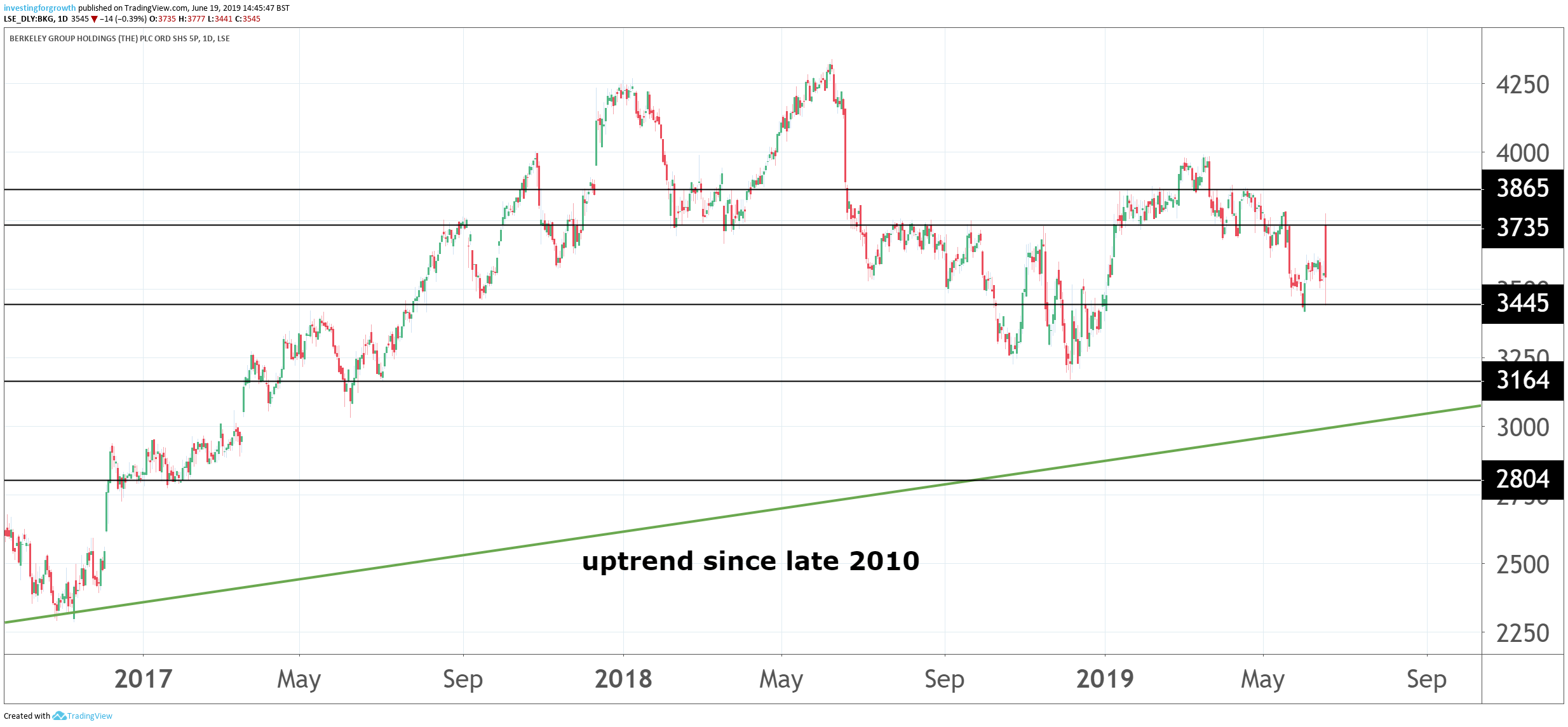Berkeley Group results get mixed reception
Many think the share price can do better, but making headway is proving hard work.
19th June 2019 15:33
by Graeme Evans from interactive investor
Many think the share price can do better, but making headway is proving hard work.

Today's share price reaction to better-than-expected results from Berkeley Group Holdings (LSE:BKG) highlight the Brexit drag affecting the housebuilder, as it attempts to work through a five-year plan to deliver £3 billion of profits by April 2021.
Based on this morning's annual results, Berkeley is 18% ahead of its profits target despite the ongoing macro and political uncertainty. Pre-tax profits for the most recent financial year to April 30 fell as expected, but were some 10% ahead of market expectations.
That gave shares in the London and South-East focused developer an initial boost of more than 3%, only for this surge to have unwound within an hour of the opening bell. Even though the group has a record of consistently delivering results ahead of expectations, the share price about-turn focused on guidance for 2020 that was some 5% below the current consensus.
Shares were later 1% lower at 3,512p, meaning they've barely changed over the course of 2019. Many analysts think there's room for the shares to do much better, particularly given that today's results highlight a very strong balance sheet with net cash of £975 million and no change in the level of planned capital returns of about £280 million a year up until 2025.

Source: TradingView Past performance is not a guide to future performance
In the past financial year, 5.6 million shares were bought back in the market for £198.9 million while £53 million was paid out in dividends. The £280 million equates to £2.16 per share, which is an 8% increase on the company's initial plan of £2 per share.
Berkeley warned that the pace of returns would be dictated by market conditions, even though it continues to make progress executing its strategy through a number of successful regeneration projects.
It said: "Like all responsible businesses who operate in cyclical markets, we have been, and will remain cautious in our investment in this environment, and this will determine the speed with which we deliver the value from our assets and invest in new opportunities."
With Berkeley more exposed to London and the South-East, analysts at Canaccord Genuity noted the shares had underperformed the sector by around 10% so far in 2019. The current price to net asset value multiple of 1.48 times is broadly in line with the sector average.
They said: "Clearly the obvious macro and political risks remain, but the group is in great shape and continues to deliver results materially ahead of expectations. Margins and profits are expected to normalise from here but assuming market conditions hold up, we expect the group to continue to deliver strongly."
They have a price target of 3,980p, which compares with 4,300p at JP Morgan Cazenove and 3,862p for analysts at Jefferies.
The current phase of the Berkeley strategy began in 2011, when the company had net assets of £900 million, was ungeared and had an estimated £2.3 billion of future gross profit in its land holdings. From this base it made a commitment to return £1.7 billion to shareholders over the following 10 years, which was subsequently increased to £2.2 billion.
Berkeley now has an estimated £6.2 billion of future gross profit in its land holdings, whilst net assets are £3 billion. Over the eight years, shareholder returns of £11.34 a share have been made through a combination of dividends and share buy-backs.
It said in last year's interim results that it planned shareholder returns of £280 million for a further four years to 2025, assuming no material deterioration in the operating environment.
These articles are provided for information purposes only. Occasionally, an opinion about whether to buy or sell a specific investment may be provided by third parties. The content is not intended to be a personal recommendation to buy or sell any financial instrument or product, or to adopt any investment strategy as it is not provided based on an assessment of your investing knowledge and experience, your financial situation or your investment objectives. The value of your investments, and the income derived from them, may go down as well as up. You may not get back all the money that you invest. The investments referred to in this article may not be suitable for all investors, and if in doubt, an investor should seek advice from a qualified investment adviser.
Full performance can be found on the company or index summary page on the interactive investor website. Simply click on the company's or index name highlighted in the article.